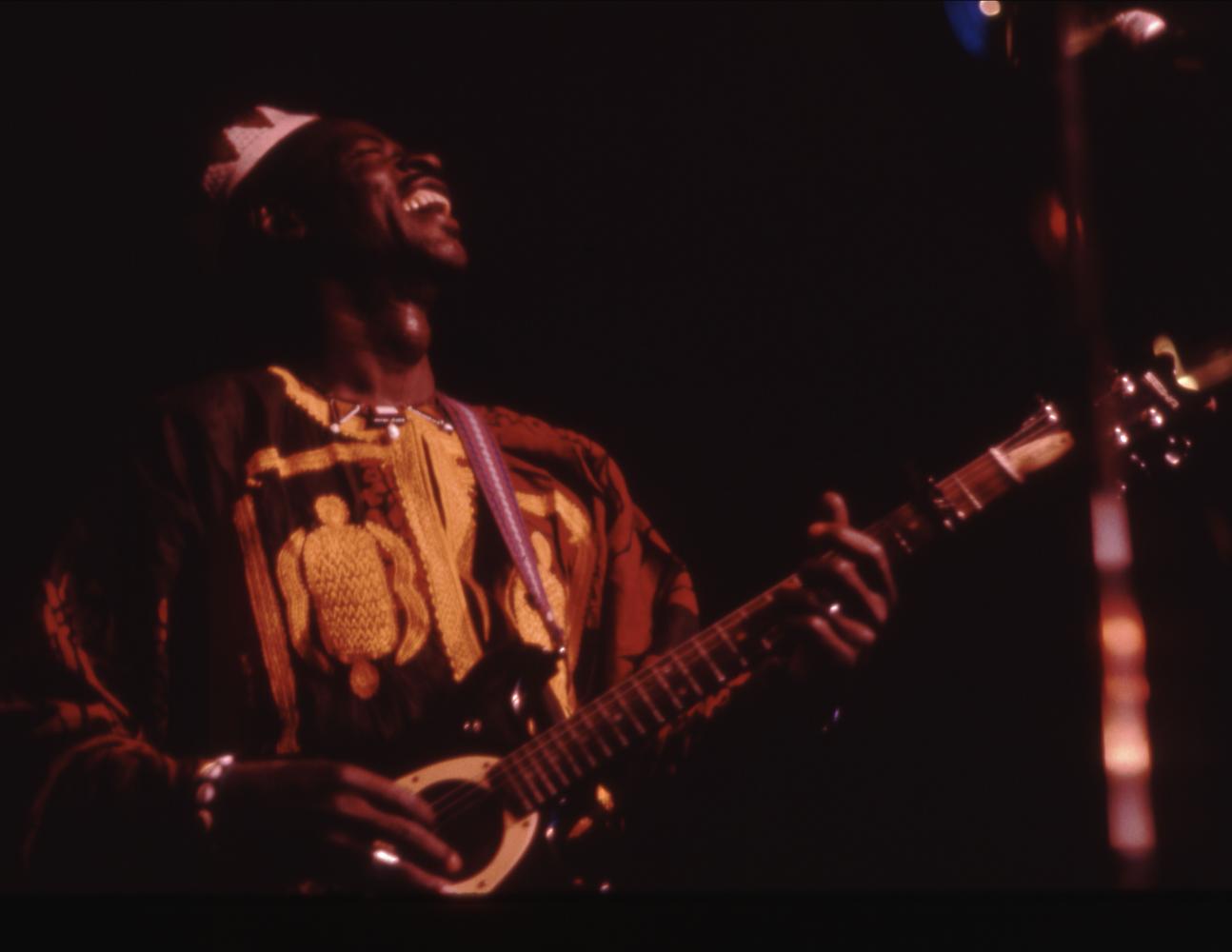
The late Malian singer and guitarist Ali Farka Toure took his music on the road, travelling from his beloved farm in Niafunke, in northwestern Mali, to thrill audiences around the globe, until his untimely death in 2006.
I had the good fortune to see Ali perform solo and with a trio on a number of occasions in Japan during the early 1990s, and to interview him several times. Once, during an interview in a hotel coffee shop in suburban Tokyo, he launched into a song on the njerkle (single-stringed guitar) to show me the rhythm and melody of just one kind of music he played (although he played music from all parts of Mali, his repertoire was mainly based on northern Malian traditions). He told me that he sang in 11 different languages.
He was larger than life, and he was his own man. Backstage after a concert in Shibuya, his manager invited us to meet the great man. He didn't want to talk about music because someone had told him that Shibuya had a park. He asked the Japanese journalists if there were deer in the park and whether we could all go hunting. No? How about some fishing? And he then proceeded to show us all how to throw a net to catch fish, which I told him was very similar to how my son's family fished in Isan. He remembered that and the next time I saw him he asked me when we were going fishing.
Toure's last album was the posthumous release Savane in 2006, and although his son Vieux Farka Toure has kept his music alive with his recordings and concerts -- there are also two tribute bands, Ali Farka Toure All Stars and the Ali Farka Toure band -- nothing from his archive of unreleased tracks has been released since then. World Circuit's recent release Voyageur showcases Toure's jam sessions, collaborations and sound checks from his many concerts and informal sessions. Produced by Vieux Farka Toure and veteran producer Nick Gold, the new album goes back as far as 1991 and ends with music from his 2004 tour.
It is a real and unexpected treat to get another Toure compilation. And from the first track, Safari (a Swahili term that means journey), the listener can sit back and luxuriate in the classic Songhai sound he often performed -- spare guitar, catchy calabash percussion and flute riffs and Ali's expressive voice soaring over the music. It's a wonderful intro. To counterpoint the acoustic opener, Sambadio, a Fulani song about farming (one of Toure's great loves) breaks out from his spare guitar riffs with great backing vocals and Pee Wee Ellis' jazz arrangement -- all understated and cool.
Apart from these two tracks, the standouts for me are the three songs that feature Malian diva Oumou Sangare. Bandolobourou is a wonderful musical conversation between two old friends, while Cherie features Toure's distinctive guitar riffs vying with Sangare's vocal pyrotechnics.

But my favourite song is Sadjona, a traditional hunting song from the southern Wassolou region where Sangare comes from (Toure was from northwest Mali).
It seems to be something of a praise song for Toure and his fame as a Malian musician. It's a terrific tribute to one of Africa's greatest musicians. Listening to the album is a real pleasure -- highly recommended.
World Beat pays tribute to the legendary Congolese guitarist Denis Lokassa Kasiya, better known by his stage name Lokassa ya Mbongo, who died on March 21 in the US after a long illness. He was 80 years old.
Born in Kinshasa in 1946, he was well-known for his long stint with megastar Tabu Ley Rochereau's Afrisa International band (previously, African Fiesta National), during its formative and golden years, 1969 to 1978. During this time, he played alongside lead guitar stars Michelino and Dino Vangu, but unlike most Congolese guitar gods, Mbongo was not a lead guitarist as he was content to provide the rhythm, and was regarded as one of the very best Congolese rhythm guitarists of all time. He was part of Tabu Ley's band when Afrisa performed its breakthrough concert at the Olympia hall in Paris in 1970.
In 1978, he formed African All Stars in Abidjan but eventually moved to Paris in 1984, where he worked with producer Ibrahim Sylla, as well as Quatre Etoiles members Syran M'Benza and Bopol Mansiamina. As a session musician, he worked with Abeti and Pepe Kalle, and was influential in the development of the Congolo-Paris sound and Kanda Bongo Man's rapid, high-tempo soukous. His hits Marie-Jose and Bonne Annee with Soukous Stars, which he formed with other Congolese musicians in Paris in 1989, are often on my DJ decks when I need to fill the dancefloor. RIP Lokassa ya Mbongo.
John Clewley can be contacted at clewley.john@gmail.com.







